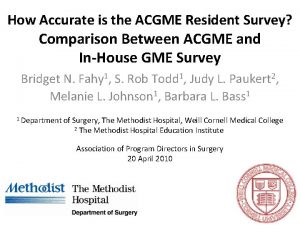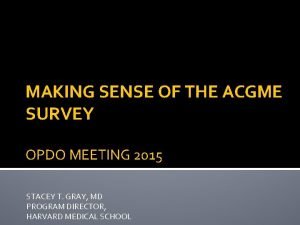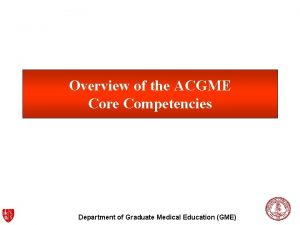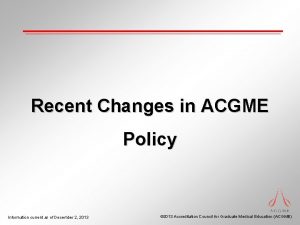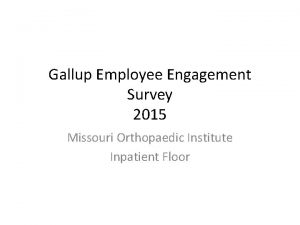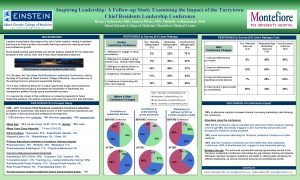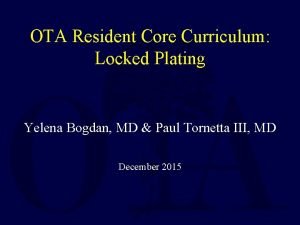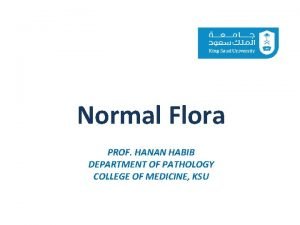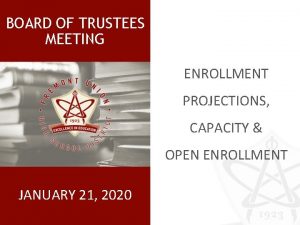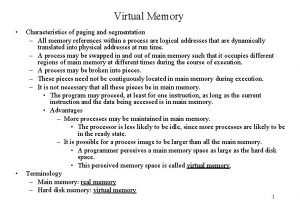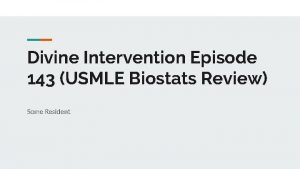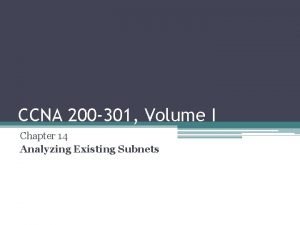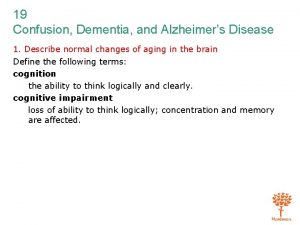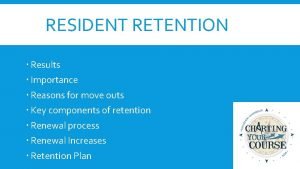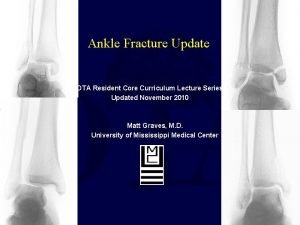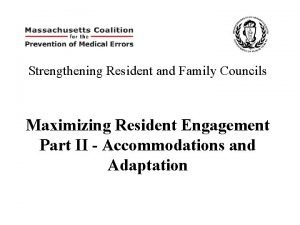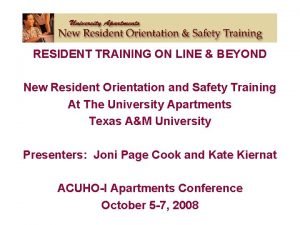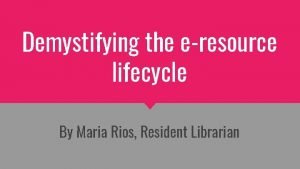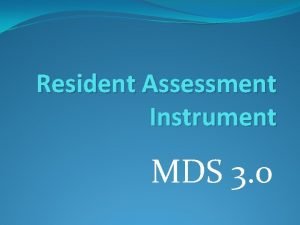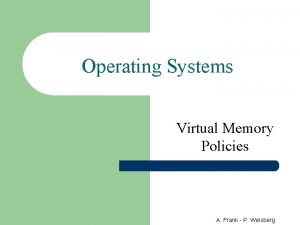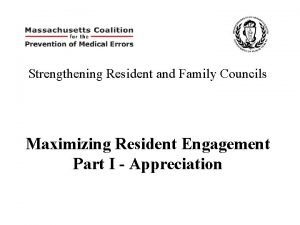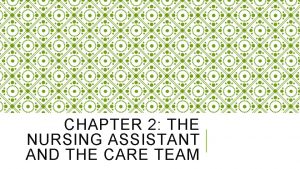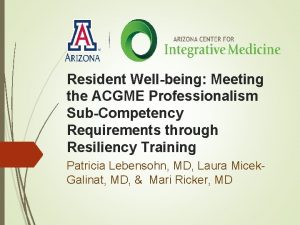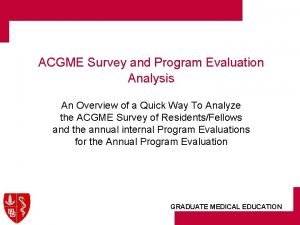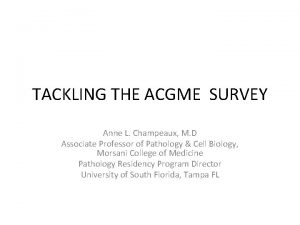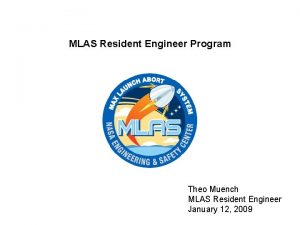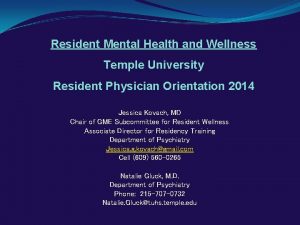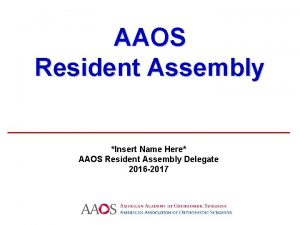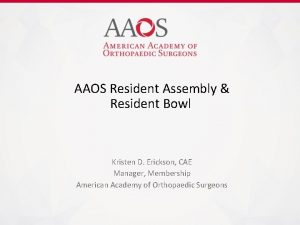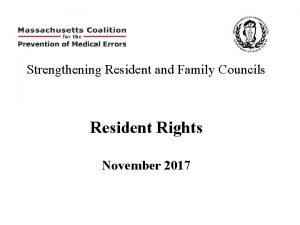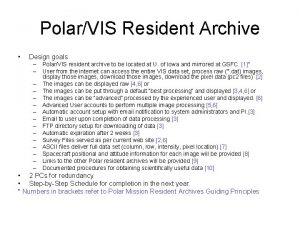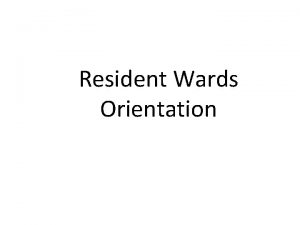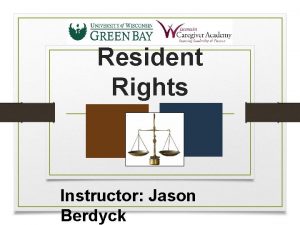The ACGME Resident Survey 2015 16 Office of

































































- Slides: 65

The ACGME Resident Survey 2015 -16 Office of GME

REMEMBER!!! - Disclaimer Samples of these surveys are not available. The samples that follow are proposed based on prior surveys, the statements we see in the survey results and the FAQs. Unlike previous Resident/Fellow and Faculty Surveys that were comprised of static questions, these are currently comprised of a bank of questions that may vary depending on a person’s responses, their level of education (residents/fellows), or their role in the program (faculty). Not all survey takers will see the same questions. The ACGME will continue to focus on general content areas ( Duty Hours, Faculty, Evaluation, Education Content, Resources, Patient Safety, and Teamwork) rather than individual survey questions.

ACGME On-line Resident/Fellow/Faculty Survey • The ACGME requires all core program residents and fellows in programs and all core faculty to complete an online survey. • Occurs each year from mid-January through early June. • General survey takes about 10 minutes to complete, contains questions about clinical and educational experience, as well as duty hours worked.

ACGME On-line Resident/Fellow/Faculty Survey • Specialty-specific surveys may be required (A&I, Anesthesiology, EM, IM& all subs, NS, Neurology, OB-GYN, Ophthalmology, Ortho, Spine, Otolaryngology, Pathology, Peds, Plastics, Hand Surgery, Preventive Med, Psych, Therapeutic Rads, Surgery, Surg CC, Pedi Surg, Vascular Surg, Thoracic Surg, Urology, IM-Peds, Urogyn). • Trainees/faculty have 5 weeks to complete survey. • ACGME requires 70% of active residents/fellows and 60% faculty to complete survey. • If <70% completion two years in a row, program may face administrative withdrawal of accreditation.

ACGME On-line Resident/Fellow/Faculty Survey • If <70% response rate for trainees and <60% response rate for faculty, ACGME sees results, but program and GME Office does not – disadvantages us. • Programs can track who has completed survey, but do not see results until all surveys in the country are closed – mid. June. • Results are confidential and aggregated after survey is closed. Programs with <4 trainees will have aggregated data over at least three years. • Program/Institution can use results to improve program during annual review process.

ACGME On-line Resident/Fellow/Faculty Survey • ACGME/RC will use results over past year to evaluate program at RC annual review process. May be the reason for focused site visits • GME Office and GMEC will use surveys for special reviews and monitoring of programs. Dashboards should be seen as an internal early warning system. • If RC asks for site visit, survey results will be used by site visitor.

ACGME On-line Resident/Fellow/Faculty Survey • ACGME/RC will NOT CONTACT trainees/faculty to take the survey. • ACGME/RC will not remind residents/fellows/faculty about the survey. • It is the responsibility of the program to notify the trainees and faculty, remind them to complete it and monitor the compliance with completion.

Duty Hour FAQs

What activities are included in "duty hours”? • All clinical and academic activities related to the residency program n n n clinical cases (both inpatient and outpatient care), administrative duties related to clinical cases, the provision for transfer of patient care, time spent in-house during call activities, and scheduled academic activities such as conferences, journal club, and grand rounds.

What activities are included in "duty hours”? • All hours spent on activities required by the accreditation standards such as memberships on hospital committees, or any activities that are an accepted practice in residency programs, such as participating in interviewing residency candidates. • Does NOT include reading, studying, and preparation time spent away from the hospital or ambulatory site. • For call from home - only the hours spent in the hospital after being called in count toward duty hours.

What does “averaged over a four-week period” mean? • This means that the average should be working hours within, and not across, rotations. • It is not appropriate to combine rotations having in-house call with those that do not include call to obtain a lower average. • It is inappropriate to average a vacation week (with 0 hours worked) with regular duty weeks to obtain a lower average.

“ 1 day in 7 free” • Does the “ 1 day in 7 free”” mean that I have to have 1 day per week off? NO – averaged over four weeks • Defined as a 24 hour period • Allows for a “golden weekend” • Two nights in house, for example a Friday and a Saturday night in a row, is not acceptable without a 10 -hour break between shift. •

How does the ACGME define “adequate time for rest” between duty shifts? • Generally defined as 10 hours. • Programs may provide somewhat shorter rest periods when appropriately educationally justified. • Allowing added time for didactic lectures of high importance, or for surgical experience in rare cases or cases with particular educational value, are examples most Review Committees would consider appropriate.

At-home call • The only duty hour regulation that applies to at home call is the 80 hours/week, averaged over a four-week period. n n n This includes only time spent in the hospital. Coming into the hospital does not reset the 810 hour break period. If at-home call becomes as busy as in-house call, then it should be counted as such.

If I'm on call from home, but I have to go to the hospital, is that in-house call? No • For call taken from home, any time spent in the hospital after being called in is counted toward duty hours. • • Call from home that does not result in travel to the hospital or clinical site is NOT to be included in duty hours.

If call from home isn’t included in duty hours, is it permissible for me to take call from home or night float for extended periods, such as a month? • No - because of the need for 1 day off in 7. • Assignment of a partial month (more than six days but less than 24 days) is possible.

Do I include my research project in duty hours worked? • Research time is included if it is a program-required activity. • If the research is pursued on the resident or fellow’s own time (without a program requirement), it is not included in on-duty time.

What does "didactics" mean? • The word didactic refers to systematic instruction by means of planned learning experiences such as class room lectures, conferences, and grand rounds. • It is often used in contrast with “clinical” education.

What does service mean? • Is not well-defined by ACGME except for the impression that it is activity that could be done by other non-professionals such as transport or phlebotomy. • However, these things are sometimes necessary for patient care and should be the first issue when considering this topic.

General Survey Design • Questions divided into 6 “buckets”: Duty Hours Faculty Evaluation Educational Content Resources Patient Safety/Teamwork • Specialty-specific questions • • •

General Survey Answer Definitions • • • Very often – very frequently; extremely often Often - frequently; many times; not seldom Sometimes - on some occasions; at times Rarely – infrequently Never - at no time; not ever

Theoretical survey questions The first questions are the ACGME requirements regarding duty hours. • Read each requirement carefully and give your honest evaluation for each question. At times, the first option indicates the worst situation, while in some cases, the first option is the best situation. • Answer each question in this survey about your experiences since the beginning of the current academic year.

Duty Hour “Bucket” How often did you break the rule that duty hours must be limited to 80 hours per week, averaged over a four-week period, inclusive of all in-house call activities? o o o Never Rarely Sometimes Often Very often

How often did you break the rule that residents/fellows must be scheduled for a minimum of 1 day in 7 free from all residency related duties, averaged over a 4 week period? o Never o Rarely o Sometimes o Often o Very often

Since the beginning of the current academic year, have you ever taken in-house call? (PGY level specific questions may follow) In-house call are duty hours in addition to the regular resident work day that are spent within a sponsoring or participating institution so that residents are immediately available, as needed, for clinical duties. In-house call does not include night float, being on call from home, nor regularly scheduled overnight duties. Residents in their beginning year of training (see FAQ for specialty-specific definitions of "beginning year of training") should not be assigned in-house call. o Yes o No

How often did you break the rule that inhouse call must occur no more frequently than every third night, averaged over a four-week period? o Never o Rarely o Sometimes o Often o Very often

How often have you been assigned night float duty for more than 6 consecutive nights? o o o Never Rarely Sometimes Often Very often

How often did you not have an 8 -hour period provided between all scheduled duty periods? o Never o Rarely o Sometimes o Often o Very often

How often did you break the rule that continuous on-site duty, including in-house call, may be scheduled to a maximum of 24 consecutive hours with up to 4 additional hours for essential patient safety and resident education in the transition of care? o o o Never Rarely Sometimes Often Very often

Since the beginning of the current academic year, have you ever taken athome call? (May be an old question - not on current survey responses. ) o Yes o No

When you take at-home call and are called into the hospital, the hours you spend in-house should be counted in the 80 hour limit. How often did you count these hours towards the 80 -hour limit? o o o Never Rarely Sometimes Very often Extremely often Not applicable: You were not called into the hospital from home

10. Which of the following explain why you reported breaking one or more of the duty hour rules (Y/N): a. Because your patient(s) needed your expertise, skill, or attention? b. Because you had to complete paperwork on patients, or other administrative work? c. Because you wanted to work additional hours for the educational experience? d. Because you had to cover someone else’s work or patient load? e. Because of a night-float system? f. Because of a schedule conflict, such as educational conferences scheduled during your free time? g. Any other reasons? (open-ended text box)

Faculty “Bucket” • Remember, answer each of these survey questions based on your experiences since the beginning of the current academic year. • How sufficient is the supervision you receive from faculty and staff in your program: o o o Not at all sufficient Slightly sufficient Somewhat sufficient Very sufficient Extremely sufficient

• o o o How often do your faculty and staff provide an appropriate level of supervision for residents when the residents care for patients? Extremely often Very often Sometimes Rarely Never

How sufficient is the instruction you receive from faculty and staff in your program? Although the type of instruction residents receive varies based on their specialty, instruction can occur while rounding and caring for patients, and during conferences and lectures. o o o Not at all sufficient Slightly sufficient Somewhat sufficient Very sufficient Extremely sufficient

Thinking about the faculty and staff in your program overall, how interested are they in your residency education? o o o Extremely interested Very interested Somewhat interested Slightly interested Not at all interested

Thinking about the faculty and staff in your program overall, how effective are they in creating an environment of scholarship and inquiry? o o o Extremely effective Very effective Somewhat effective Slightly effective Not at all effective

Evaluation “Bucket” The next questions are about the ways residents/fellows evaluate their program. • If you want to review feedback on your performance, are you able to access your evaluations in some way, either actual evaluations or in a summarized format? Yes o No o

Do you have the opportunity to evaluate your faculty members at least once a year? o Yes o No

How satisfied are you that your program treats your evaluations of faculty members confidentially? o o o Not at all satisfied Slightly satisfied Somewhat satisfied Very satisfied Extremely satisfied

Do you have the opportunity to evaluate your overall program at least once a year? o Yes o No

How satisfied are you that your program treats your evaluations of the program confidentially? o o o Not at all satisfied Slightly satisfied Somewhat satisfied Very satisfied Extremely satisfied

How satisfied are you with the way your program uses the evaluations that residents/fellows provide to improve the program? o o o Not at all satisfied Slightly satisfied Somewhat satisfied Very satisfied Extremely satisfied

Overall, how satisfied are you with the written or electronic feedback you receive after you complete a rotation or major assignment? o o o Not at all satisfied Slightly satisfied Somewhat satisfied Very satisfied Extremely satisfied

Educational Content “Bucket” • Has your program provided you with goals and objectives for each rotation and major assignment in either a hard copy or electronic form? Yes o No o

Has your program adequately instructed you on how to manage the negative effects of fatigue and sleep deprivation on patient care? o Yes o No

How satisfied are you with the opportunities your program provides for you to participate in scholarly activities? o o o Not at all satisfied Slightly satisfied Somewhat satisfied Very satisfied Extremely satisfied

In your opinion, how often do your rotations and other assignments provide an appropriate balance between your residency education and other clinical demands? o o o Very often Often Sometimes Rarely Never

How often has your clinical education been compromised by excessive service obligations? o o o Very often Often Sometimes Rarely Never

How often do your supervisors delegate responsibilities to you that are appropriate for your skill level? Appropriate delegations of clinical responsibilities are those which allow you to acquire clinical skills with tasks that are neither too easy, nor too difficult. o o o Very often Often Sometimes Rarely Never

Residents may receive reports summarizing their practice habits in comparison to that of their peers. Have you been provided with this kind of report? (Practice habits information) These reports may include information such as number of tests ordered or read, patient safety surveys, adherence to disease-specific standard protocols, and productivity (such as number of patients seen, or number of procedures performed). o Yes o No

Do you have the opportunity to see patients across a variety of settings such as in ambulatory settings, federally funded health centers, private clinics or other community settings that are appropriate to your specialty? Yes No

Resources “Bucket” • When you need reference materials for your specialty, do you have ready access to printed or electronic materials? Yes o No o

• Several EMR questions: n n n • Use EMR in hospital? Use EMR in ambulatory settings? EMR integrated across settings? Is your EMR effective? Yes o No o

• Does your program provide a way for you to transition care to another qualified reporter when you are fatigued? Yes o No o

How satisfied are you with your program’s process to deal confidentially with problems or concerns residents/fellows might have? o o o Extremely satisfied Very satisfied Somewhat satisfied Slightly satisfied Not at all satisfied

How often has your ability to learn been compromised by the presence of trainees who are not part of your program, such as residents from other specialties, subspecialty fellows, Ph. D students, or nurse practitioners? o o o Never Rarely Sometimes Very often Extremely often

To what extent does your program provide an environment where residents/fellows can raise problems or concerns without fear of intimidation or fear of retaliation? o o o Not at all A little Somewhat Quite a bit A great deal

Patient Safety/Teamwork “Bucket” How often do you personally tell patients about the respective roles you and the more senior physicians will play in their care? o o o Never Rarely Sometimes Very often Extremely often

How effective is your program in creating a culture that reinforces your personal responsibility for patient safety? o o o Extremely effective Very effective Somewhat effective Slightly effective Not at all effective

Have you personally participated in departmental or institutional quality improvement or patient safety activities? • Quality improvement and patient safety projects may be initiated by residents, programs, or institutions and may include activities such as participating in efforts to reduce infections, conducting root cause analyses of errors, or completing a Practice Improvement Module. Yes o No o

How often is essential information lost or not communicated during shift changes or patient transfers? o Never o Rarely o Sometimes o Very often o Extremely often

How often do you work in interprofessional teams to care for patients? • Interprofessional teams include physicians from one or more specialties, nurses and other health professionals such as pharmacists, social workers, and respiratory therapists. o Very often Often Sometimes Rarely Never o o

How effectively do residents, fellows, faculty, nurses and other staff work in teams to provide clinical care? o o o Extremely effectively Very effectively Somewhat effectively Slightly effectively Not at all effectively

Which of the following best summarizes your opinion of your residency program? o The best possible experience – if I had to select residency programs again, I’d pick this one o A good experience – if I had to select residency programs again, I would probably choose this one. o A neutral experience – if I had to select residency programs again, I might or might not choose this one. o A negative experience – if I had to select residency program again, I would probably not choose this one. o A very negative experience – if I had to select residency programs again, I would definitely not pick this one.
 Acgme resident survey
Acgme resident survey Acgme survey
Acgme survey Acgme core competency
Acgme core competency Eric holmboe acgme
Eric holmboe acgme Acgme accreditation withheld
Acgme accreditation withheld Gallup employee engagement 2015
Gallup employee engagement 2015 Acls abcde secondary survey
Acls abcde secondary survey Tarrytown chief resident conference
Tarrytown chief resident conference Partially resident textures
Partially resident textures Yelena bogdan md
Yelena bogdan md What is income tax
What is income tax Define resident flora
Define resident flora Misappropriation of resident property
Misappropriation of resident property Attending vs resident
Attending vs resident Resident set management
Resident set management Transamerica estate planning foreign nationals
Transamerica estate planning foreign nationals Employment of non-resident aliens in the philippines
Employment of non-resident aliens in the philippines Divine intervention 143
Divine intervention 143 Magic mask
Magic mask A helpful way for an na to respond to hallucinations is to
A helpful way for an na to respond to hallucinations is to Resident retention
Resident retention Pab ankle fracture
Pab ankle fracture Resident and family engagement
Resident and family engagement Telephone 911
Telephone 911 Resident lifecycle
Resident lifecycle Resident assessment instrument definition
Resident assessment instrument definition When ambulating a resident should be wearing
When ambulating a resident should be wearing The working set strategy
The working set strategy Resident and family engagement
Resident and family engagement What is conflict resolution in customer service
What is conflict resolution in customer service Chapter 2 foundations of resident care
Chapter 2 foundations of resident care Thiếu nhi thế giới liên hoan
Thiếu nhi thế giới liên hoan Tia chieu sa te
Tia chieu sa te Một số thể thơ truyền thống
Một số thể thơ truyền thống Thế nào là hệ số cao nhất
Thế nào là hệ số cao nhất Slidetodoc
Slidetodoc Sơ đồ cơ thể người
Sơ đồ cơ thể người Số.nguyên tố
Số.nguyên tố đặc điểm cơ thể của người tối cổ
đặc điểm cơ thể của người tối cổ Mật thư anh em như thể tay chân
Mật thư anh em như thể tay chân Các châu lục và đại dương trên thế giới
Các châu lục và đại dương trên thế giới Tư thế worm breton
Tư thế worm breton ưu thế lai là gì
ưu thế lai là gì Thẻ vin
Thẻ vin Tư thế ngồi viết
Tư thế ngồi viết Cái miệng nó xinh thế
Cái miệng nó xinh thế Các châu lục và đại dương trên thế giới
Các châu lục và đại dương trên thế giới Bổ thể
Bổ thể Từ ngữ thể hiện lòng nhân hậu
Từ ngữ thể hiện lòng nhân hậu Tư thế ngồi viết
Tư thế ngồi viết Ví dụ về giọng cùng tên
Ví dụ về giọng cùng tên Làm thế nào để 102-1=99
Làm thế nào để 102-1=99 Thơ thất ngôn tứ tuyệt đường luật
Thơ thất ngôn tứ tuyệt đường luật Chúa yêu trần thế alleluia
Chúa yêu trần thế alleluia Hươu thường đẻ mỗi lứa mấy con
Hươu thường đẻ mỗi lứa mấy con đại từ thay thế
đại từ thay thế Diễn thế sinh thái là
Diễn thế sinh thái là Vẽ hình chiếu vuông góc của vật thể sau
Vẽ hình chiếu vuông góc của vật thể sau Công thức tiính động năng
Công thức tiính động năng Thế nào là mạng điện lắp đặt kiểu nổi
Thế nào là mạng điện lắp đặt kiểu nổi Tỉ lệ cơ thể trẻ em
Tỉ lệ cơ thể trẻ em Lời thề hippocrates
Lời thề hippocrates Vẽ hình chiếu đứng bằng cạnh của vật thể
Vẽ hình chiếu đứng bằng cạnh của vật thể Quá trình desamine hóa có thể tạo ra
Quá trình desamine hóa có thể tạo ra Môn thể thao bắt đầu bằng chữ f
Môn thể thao bắt đầu bằng chữ f Hình ảnh bộ gõ cơ thể búng tay
Hình ảnh bộ gõ cơ thể búng tay
